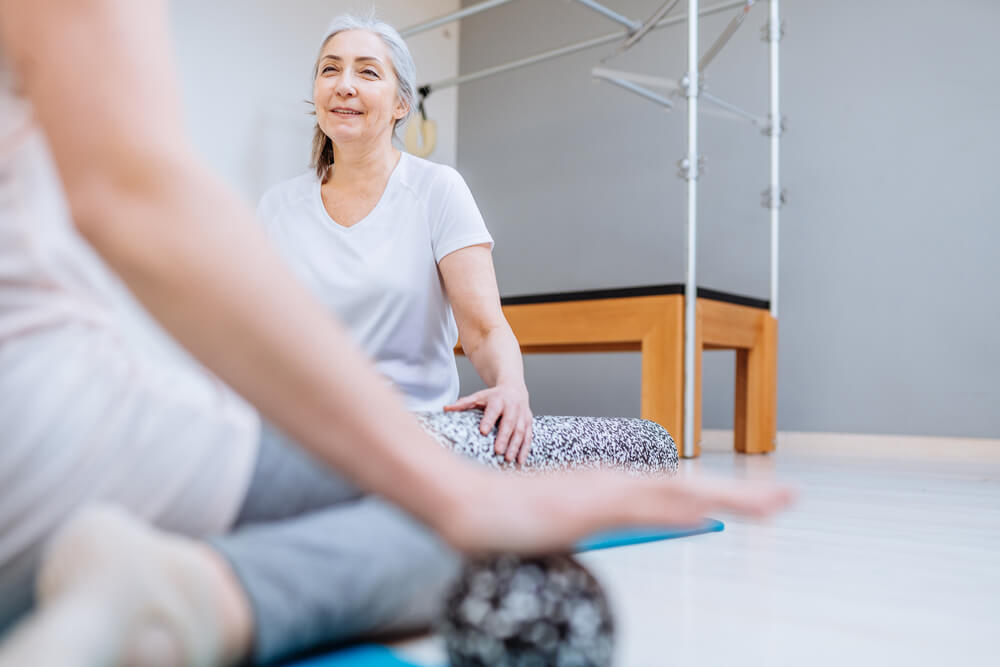Every woman’s journey into menopause is a unique experience, as different as the individual herself. Marked by the cessation of menstrual cycles, menopause is a natural phase of life that brings about profound changes in a woman’s body. This period can often be accompanied by an array of symptoms such as hot flashes, weight gain, mood swings, and sleep disturbances, intruding upon the harmony of daily life.
Yet, amidst these fluctuating tides, exercise could serve as an anchor. Emphasizing the importance of physical activity may sound like a tired refrain in the context of overall health preservation, but its potency multiplies when it comes to women passing through menopause. This can additionally be explained to you by medical professionals who offer services of obstetrics and gynecology in South Miami, Florida and who are equipped to help women going through this lifechanging period.
As an influential key player in mitigating menopausal symptoms, exercise proves to be an effective non-pharmacological method that goes a long way in enhancing physical wellness and emotional equanimity.
This article illuminates the vital role of maintaining regular physical activity during this significant life stage. It explores the myriad benefits of an active lifestyle and recommends various forms of exercises suitable for postmenopausal women. From aerobic activity and strength training to yoga practices, the reader will be guided on a path of physical wellness designed to optimize health during menopause and beyond.
Understanding Menopause
Comprehensive Explanation of the Menopause Process and its Effects on the Body
Menopause signifies a pivotal shift in a woman’s reproductive life. It is defined as the phase that concludes one’s menstruating years, typically occurring in the late 40s or early 50s. While biological clock ticks differently in every individual, women reach menopause after going twelve months without a menstrual period. This departure from the reproductive stage is triggered by the decreased production of hormones estrogen and progesterone in the ovaries.
The consequences of this hormonal shift go beyond the boundaries of reproduction, impacting various bodily functions. Common complaints encompass vasomotor symptoms like hot flashes and night sweats, owing to the tidally fluctuating hormones. With menopause, bone loss may accelerate, increasing the risk of osteoporosis. These internal shifts often arrive hand in hand with weight gain because of a slowed metabolism and changed fat distribution.
Explication of Common Symptoms and Health Risks Associated with Menopause
Menopause is a much broader spectrum than just the cessation of menstrual cycles. It accompanies a mixed bag of symptoms, some more well-known than others. Among the widespread manifestations are:
- hot flashes,
- moodiness,
- sleep disturbancs,
- decreased libido.
Many women also notice physiological changes such as:
- weight gain around the midsection,
- thickening of waistline,
- increased fat deposition in other areas
Additional symptoms may include headache, memory problems and difficulty concentrating.
The waning hormone levels during menopause also place women at increased risks for certain health conditions. Owing to the protective properties of estrogen, decreased levels can escalate osteoporosis risk as bone loss accelerates. Similarly, diminished estrogen supply can contribute to higher cardiovascular disease vulnerability as it allows for a rise in “bad” LDL cholesterol and a decrease in “good” HDL cholesterol.
In a nutshell, the varied experiences of menopause pivot largely around the hormonal shifts and their cascading impacts on a woman’s overall health. But these effects are not insurmountable. Several lifestyle modifications, particularly incorporating regular physical activity, could help manage these challenges constructively.
The Connection Between Exercise and Menopause
Detailed Overview of the Benefits of Exercise During Menopause
Amid the hormonal flux of menopause, physical activity tends to take a central role in managing symptoms and mitigating health risks. It is an indispensable part of any ‘menopause fitness plan’ that seeks to improve the overall quality of life during this phase. Embracing a ‘healthy exercise menopause’ lifestyle can assist in maintaining an optimal body weight, bolstering cardiovascular health, and promoting strong, healthy bones, thus reducing risks of osteoporosis.
The myriad ‘post-menopausal exercise benefits’ extend to psychological well-being as well. The endorphin surge following a good workout session often lends a sense of emotional upliftment, improving mood and providing relief from the blues. Furthermore, regular exercise can imbibe a boosted sense of self-confidence and better body image, which often find themselves shaken during these transitioning years.
Insight into How Regular Physical Activity Contributes to Alleviating Menopause Symptoms
Encouraging research indicates that exercise reduces hot flashes, one of the most commonly reported symptoms of menopause. While the exact mechanism remains a topic of ongoing research, some theories suggest that exercise aids in regulating body temperature and managing stress, which in turn may affect the frequency and intensity of hot flashes.
In addition to ‘exercises for hot flashes’, physical activity is a potent tool against weight gain, a common concern in menopausal women. Through its effects of burning calories and developing muscle mass, a regular ‘menopause workout routine’ can help maintain a balanced body composition, promote weight loss and keep the inevitable metabolic decline at bay.
Moreover, incorporating weight training and aerobic exercise during menopause can help curb bone deterioration, a significant aftereffect of reduced hormone production. Weight-bearing exercises like walking, running, and weight training encourage the formation of new bone tissue, increasing bone density and lessening the risk of fractures.
Finally, activities like ‘menopause yoga practices’ and other mind-body exercises can bring a dual benefit of physical fitness and mental tranquility. These exercises can help mitigate sleep disturbances, relieve stress, and enhance general well-being, making them a comprehensive part of any ‘menopausal women exercise regimen’.

Practical Tips on Implementing Exercise during Menopause
Suggestions for Various Types of Exercise that are Beneficial During Menopause
An effective menopause workout routine usually spans across various forms of exercise. For the foundation of any ‘healthy exercise menopause’ plan, aerobic exercises like brisk walking, cycling, and swimming prove to be constructive. These activities not only boost stamina and cardiovascular health but significantly contribute to weight management.
Incorporating strength training into an exercise regimen also offers several benefits. Weight training during menopause aids in building lean muscle mass, enhancing metabolic rate, and combating weight gain. Moreover, strength training can foster heavier bone density, which helps reduce risks of osteoporosis — a common post-menopausal concern.
Besides these vigorously energetic exercises, menopause yoga practices can supplement a holistic fitness approach. Yoga has been known to mitigate stress, promote mental serenity, and enhance flexibility. Specific postmenopausal yoga poses, like bridge pose and warrior pose, have been shown to be particularly beneficial.
Advice on How to Start and Maintain a Regular Exercise Regimen
Beginning an exercise regimen, especially amidst the hormonal turmoil of menopause, might seem like a daunting task. But with realistic goals, focusing on gradual improvements rather than instant perfection, overcoming inertia becomes more plausible.
Starting with which exercises appeal most to you — whether they’re yoga, walking, or weightlifting — can instigate a more consistent commitment. Gradually, incorporating various forms of exercise can enhance workout efficiency and keep monotony at bay. At this stage of life, it becomes more about enjoying the journey than stressing over swift results.
One of the most underlined menopause exercise tips is to include activities that increase your heart rate gently, boost muscle strength, and enhance flexibility. For optimal benefits, the Center for Disease Control and Prevention recommends at least 150 minutes of moderate-intensity exercise or 75 minutes of high-intensity exercise each week, along with two or more days of strength training exercises.
Remember, the goal is consistency, not intensity. Even if it’s a few minutes each day, any exercise is better than no exercise. Seek support from a healthcare provider or fitness professional when needed, and celebrate every small progress along the ‘menopausal women exercise regimen’.
Embracing the Power of Exercise During Menopause
The journey of menopause, with all its hormonal ebbs and flows, is an integral part of a woman’s life cycle. It brings along a myriad of physiological and emotional changes that can significantly affect one’s lifestyle. However, the discomfort and health risks that may accompany this life stage can be effectively managed — and exercise is the key.
Integrating physical activity into one’s routine offers innumerable benefits ranging from symptom relief to health enhancement. From easing hot flashes and fostering weight management to boosting mood and battling bone loss, exercise becomes your ally in navigating the menopause maze. It forms an essential component of a balanced ‘menopause fitness plan’, not just as a remedy, but also as a preventive strategy against potential health risks.
Exploring various forms of ‘physical activity menopause’ routines, such as aerobic exercises, strength training, and yoga practices, adds zest to your health journey. Whether it’s the dynamic energy of aerobic exercises, the empowering feel of weight training, or the tranquility offered by yoga, incorporating these into your routine can significantly enhance your well-being during and beyond menopause.
It is never too late to kickstart your menopause exercise regimen. Every step, no matter how small, counts. Remember, the focus should be on consistency rather than intensity. And while self-direction is commendable, seeking professional advice when needed is equally important. A healthcare provider or fitness expert can guide you in tailoring an exercise program that is both enjoyable and beneficial so reach out to our team today and let us guide you through menopause.


